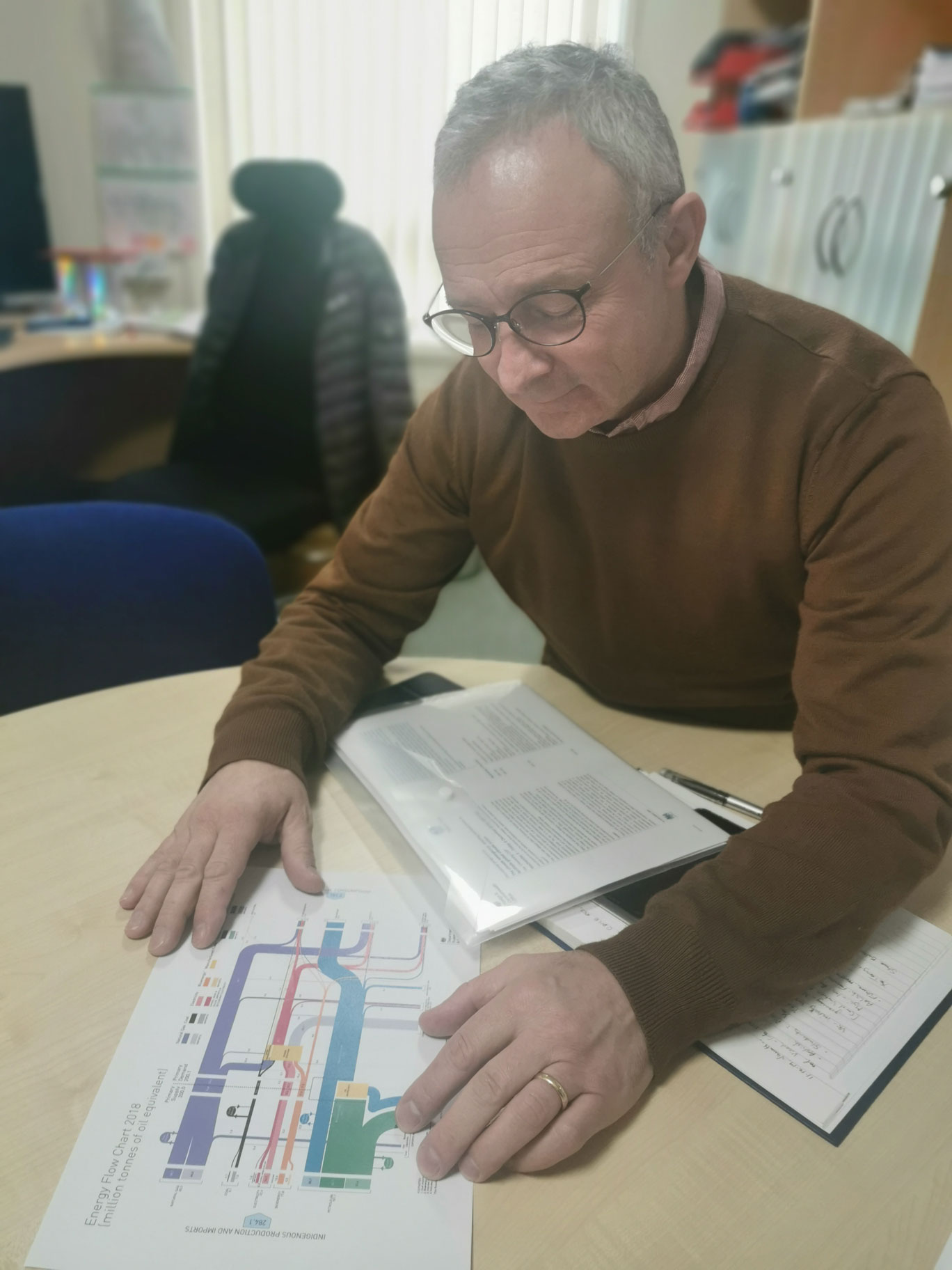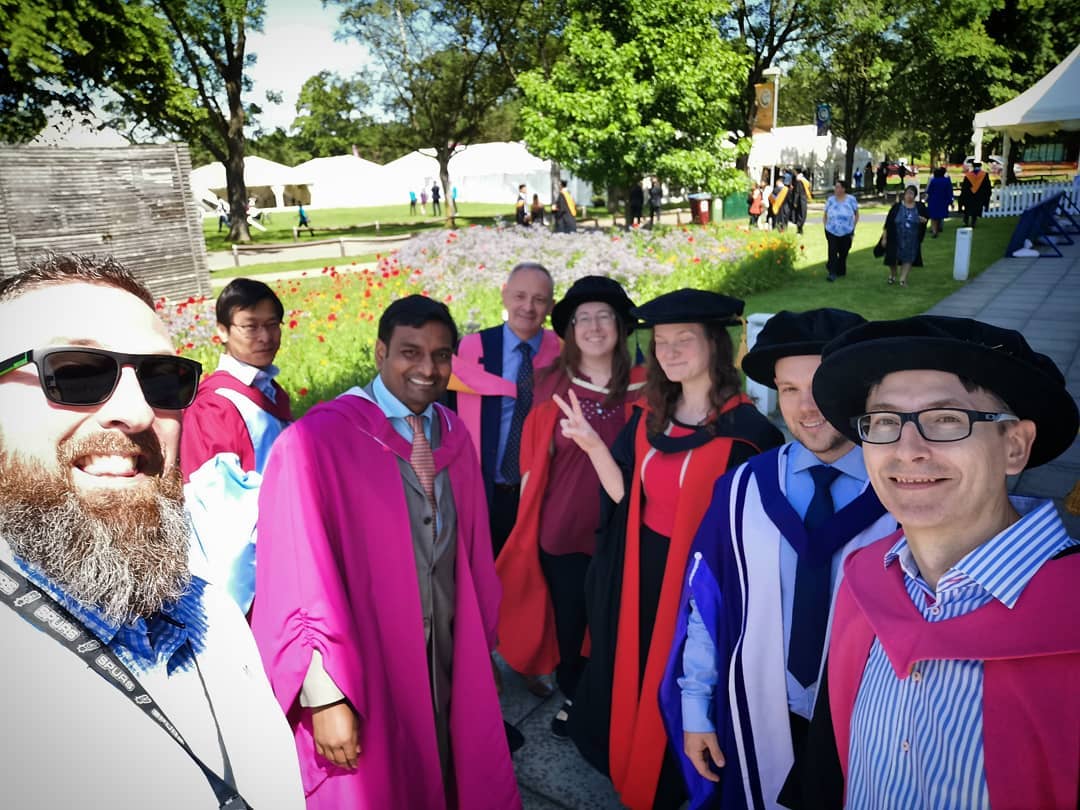A sit down with Professor Philip Longhurst
31/03/2020

Tell us a bit about your role at Cranfield and what a typical day might look like.
My job spans between four main areas. One is working with research students and researchers on projects, either the students’ own project or a project they are working on with me. There’s a bit of my job that involves business development, which is looking at future calls for work, and helping build consortia, develop ideas, going to meetings about new initiatives and sharing all of these with the Energy and Power team. There’s also a bit of my job that involves delivering projects. I’m working on one with a number of large organisations in partnership with a city council, taking heat from waste plant, distributing that heat as party of a city network to businesses and residences, generating electricity for commercial and public service vehicles, and designing the whole system or business model so that it can be adopted by any city. Finally my job also entails working with the rest of the centre staff in a mixture of admin and managerial roles throughout the variety of projects, MSc courses and business opportunities we work on collaboratively with other areas of the University. So in terms of a typical day, there really isn’t one.
Do you often work collaboratively with other areas of the University?
We do, in fact being located close to Milton Keynes gives us an ideal opportunity to work on a number of innovative projects incorporating several specialist areas of the University. Working with Milton Keynes City Council and Connected Places Catapult, myself along with a number of colleagues from Cranfield including Helen Atkinson, Graham Braithwaite, Simon Jude, James Brighton are looking at energy futures and transport, so we are bringing together our expertise in the themes of Energy and Power, Environment and Transport Systems to work collaboratively on a pan-University basis. Milton Keynes is seen as a really good testing ground for new ideas because it has both independence and isolation, and doesn’t have the layers of archaeological interference, or old infrastructure that older cities have, making it easier to test and implement new ideas.
What excites you most about what you are currently doing?
Projects aside, I think it’s the extreme diversity both in my role and in the areas I find myself. For example, talking about landfill and landfill mining, I have been to places where abject poverty lives side by side with extreme wealth, and I feel privileged as an academic to be involved in projects and research designed to narrow that gap. At other times, I have been to meetings with BT for example to talk about the extraction of the copper that formed the telephone exchange in the UK, as the transition to fibre continues. So I get an insight into the changes that are taking place in our own economy and economies ahead of ours, along with seeing developing economies taking shape, it’s all very exciting. I get to see some sights! More recently I was invited to speak at an event which involved around 30-40 politicians from around the world with a view to educate them about the impacts, implications and timescales of climate change. I was asked to give the talk for Chevening Scholars on Energy alongside Nick Dunlop, Secretary General at Climate Parliament.

On the subject of climate change and the shift we are seeing around the world, is there an opportunity for students to be involved in steering that change?
When you consider every business is exposed to decisions around climate change – the publicity of their operations, and the validity of their claims around sustainability are increasingly under scrutiny, the opportunity is vast. Within the Centre for Climate and
Environmental Protection at Cranfield we look at the enabling technologies and infrastructure required to help the transition from traditional carbon-reliant energy production to cleaner and more sustainable methods and processes. We work closely with our colleagues in the other centres within the University and look at how industry can produce and store energy in a more climate friendly way. We are at a real turning point, and the opportunities in this area are immeasurable, both in terms of employment and research.
What do you see students doing after their studies at Cranfield?
We see an increasing amount of companies asking us greenhouse gas emissions related questions, so the industry is hungry for professionals with background knowledge and the ability to apply that knowledge in an industrial context, which is something we specialise in at Cranfield.
One of the unique aspects of Cranfield is our breadth of expertise across sectors and specialisms, working with colleagues from a number of different parts of the University is commonplace, so students are exposed to both the knowledge through academic collaborations and industrial connections, giving them the opportunity to explore a multitude of options, across sectors and specialisms.
Categories & Tags:
Leave a comment on this post:
You might also like…
Keren Tuv: My Cranfield experience studying Renewable Energy
Hello, my name is Keren, I am from London, UK, and I am studying Renewable Energy MSc. My journey to discovering Cranfield University began when I first decided to return to academia to pursue ...
3D Metal Manufacturing in space: A look into the future
David Rico Sierra, Research Fellow in Additive Manufacturing, was recently involved in an exciting project to manufacture parts using 3D printers in space. Here he reflects on his time working with Airbus in Toulouse… ...
A Legacy of Courage: From India to Britain, Three Generations Find Their Home
My story begins with my grandfather, who plucked up the courage to travel aboard at the age of 22 and start a new life in the UK. I don’t think he would have thought that ...
Cranfield to JLR: mastering mechatronics for a dream career
My name is Jerin Tom, and in 2023 I graduated from Cranfield with an MSc in Automotive Mechatronics. Originally from India, I've always been fascinated by the world of automobiles. Why Cranfield and the ...
Bringing the vision of advanced air mobility closer to reality
Experts at Cranfield University led by Professor Antonios Tsourdos, Head of the Autonomous and Cyber-Physical Systems Centre, are part of the Air Mobility Ecosystem Consortium (AMEC), which aims to demonstrate the commercial and operational ...
Using grey literature in your research: A short guide
As you research and write your thesis, you might come across, or be looking for, ‘grey literature’. This is quite simply material that is either unpublished, or published but not in a commercial form. Types ...






